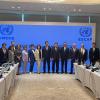News
Displaying Results 1 - 17 of 17
Increasing the use of digital solutions including those developed by the United Nations Centre for Trade Facilitation and Electronic Business (UN/CEFACT) can enhance the sustainability and resilience of supply chains and strengthen global connectivity.
In a series of capacity-building activities…
As countries seek to rapidly decarbonize their economies, investing in energy efficiency and the improved performance of buildings offers significant near term gains. Available measures can help transform the building and construction sector, which today is responsible for approximately 40% of…
Sustainable and climate finance needs in Central Asia are considerable, with an estimated 38 billion US dollars per year up to 2030. On the other hand, the total foreign direct investment flows in the region in 2022 amounted to 10 billion US dollars. The infrastructure finance gap is therefore huge…
UNECE and partners have started implementation of a multi-year project on “Improving the energy efficiency of the global building supply chain industry and its products to deliver high performance buildings” (full project budget EUR 19.8 million), funded by the International Climate Initiative (IKI…
Central Asian countries are actively working towards improving access to water and sanitation. Despite recent progress, Kazakhstan's aging infrastructure, lack of human resources and financial constraints still limit the access of rural population to improved water and sanitation services. In 2022…
Mining is an important sector and economic contributor in Central Asian countries due to their rich mineral base. However, the mining activities also generate huge amount of waste which can contain hazardous substances and must be safely stored in so-called tailings management facilities (TMFs).…
The transition towards a circular economy could create an estimated 4.5 trillion USD of global economic growth by 2030, while helping to restore natural systems. Within the landlocked countries of Central Asia, this transition can help economies diversify away from a dependence on exports of finite…
Uzbekistan is one of the world's largest producers of gold and uranium. In the last 40 years, Uzbekistan has built a strong mining industry, which is expected to grow in the years to come, given that only 20 % of the country’s territory has yet been explored. The expected rise in the number and…
While Uzbekistan has improved its environmental performance in line with the Sustainable Development Goals (SDGs) related to water and sanitation (SDG 6) and forests and tree cover loss (SDG targets 15.1, 15.2, 15.3), significant challenges remain related to air quality (SDG 11.6), water resources…
June 2022 has been the month of trade discussions in Geneva, first with the World Trade Organization’s (WTO) 12th Ministerial Conference (MC12) and then UNEC’s Steering Committee on Trade Capacity and Standards (SCTCS). Both looked in detail at responses to the ongoing impact of COVID-19, both…
With blockchain opening up many avenues in international trade – from facilitating financing and customs procedures to tracking due diligence and sustainability compliance – countries and companies are looking for successful practices to scale up their efforts to maximize the potential of this new…
Building upon the recent Innovation for Sustainable Development Review (I4SDR), UNECE and the Ministry of Innovative Development of Uzbekistan are discussing the implementation of the report recommendations and engaging in dialogue on sustainable innovation-led development this week in Geneva at…
Uzbekistan faces serious challenges in the realm of road safety, with around 3,600 people killed on its roads in 2018, according to WHO figures. Between January and March 2022 alone, 39 children lost their lives on the country’s roads, where 204 out of 1,469 road accidents involved children,…
The textile industry is a key driver of Uzbekistan’s economy, reflected in the country’s rank as sixth largest cotton producer in the world. In 2021, the country accelerated the battle against its child and forced labor violations in cotton harvest according to a new International Labour…
UNECE is deepening its support to help countries of the region capitalize on innovation to recover from the pandemic and realize the ambitious vision of the 2030 Agenda.
The UNECE Innovation for Sustainable Development Review (I4SDR) of Uzbekistan, which is currently underway, will set out…
Countries of Central Asia, the Caucasus and Eastern Europe have been hit hard by the socioeconomic impacts of the COVID-19 pandemic, which threatens to derail sustainable development progress in the region.
However, there is also a stronger momentum towards regional cooperation, and countries can…
Uzbekistan has shown remarkable growth in its transition from a centrally planned to a market based economy, with annual growth rates between 5 and 9 per cent since 2004. Innovation, namely fostering experimentation and collaboration between innovation stakeholders to find new ways for creating…


















